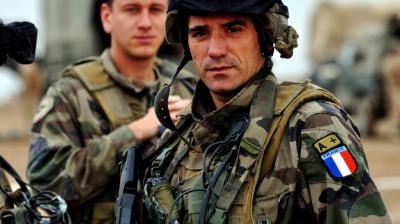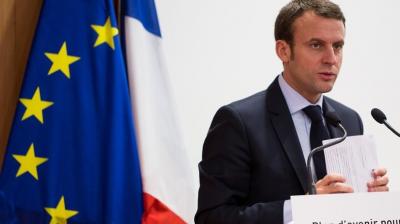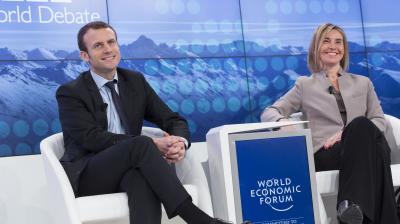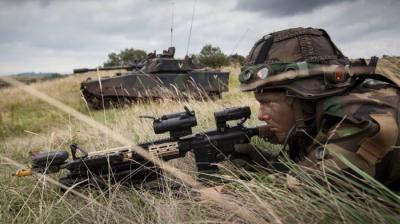
You know that something is afoot when the French start forgetting to be grumpy. Irrespective of one's politics, it would be stating the obvious to say that Emmanuel Macron pulled off a master tactical coup in beating all the country's seasoned politicians to the presidential post. In the process he uncommonly remembered to give assurances outside of his domestic audience: he gave Berlin its due and he was not shy to speak with Anglo-Saxon newspapers, thus laying the ground for his current European charm offensive.
Macron has been hitting all the French “feel-good” buttons
Macron is now riding the wave: he introduced himself to the world by swaggering into the NATO-leaders meeting on 25 May last, and endeared himself to it by mischievously tapping into the global anti-Trump backlash on the Paris Climate Accord. In doing so, he has been hitting all the French "feel-good" buttons: standing up to what has been perceived as Donald Trump's bullying, short-sighted, transactional, zero-sum and interest-driven politics. He now has some tricky parliamentary elections around the corner, but all goes to show that the French have surprised themselves into being proud of their new president, and are prepared to give him a real mandate to reform in June.
Giraffe theory
As a political strategist recently put it, Macron has unveiled his plans for France like the spots of the giraffe, but without the giraffe. He has proceeded in small impressionist touches which have built trust and confidence, and which have laid the ground for further action. But the bigger plan itself is only slowly becoming clear. During the previous presidency François Hollande similarly proceeded in small impressionist touches, but the giraffe itself never appeared. You saw the spots, yet the bigger picture never became clear, and so his mandate ultimately ended in a blur. It appears that Macron did actually have a plan for France. Once the hurdle of the June elections is over the EU will be asking whether Macron, unlike his predecessor Hollande, has a plan for Europe too.
Emmanuel Macron has much of what Europe needs. It does not lack treaties, laws, regulations, institutional expertise and technical know-how – but it lacks youth, hope, energy, belief, trust, solidarity, and a connection to its peoples.
The recent discussion on “permanent structured cooperation” has once more divided EU capitals instead of driving them forward
Much of the Union’s internal debates are symptomatic of these ills. It has become clear, for example, that waiting for everybody to agree around the table to make progress on European defence is not working. To break the deadlock, one logical conclusion was to let a core group of member states make progress in the field, unhindered by those who were less keen. But when this very sensible idea was digested by the EU’s machine and came out the other side, it had become indigestible.
The recent discussion on flexible integration in defence, which is what the Lisbon Treaty calls “permanent structured cooperation”, has once more divided EU capitals instead of driving them forward. It got caught in legal turf wars before it was even clear what it was actually for, and has since been beset by bad tempered, small-minded politics and institutional infighting. It needs perspective, vision and good politics. Can Macron deliver this?
A Macron Plan for Europe?
There is a window of opportunity casted wide open by the new American president. It is much easier today to make the case that it is time for Europe to take its fate into its own hands, as the German Chancellor put it in the wake of the NATO meeting in May. After the June parliamentary race and in the run-up to the German elections in September, Emmanuel Macron can set about capitalising on the good will and political credit he has garnered. True, he may soon find out that making concrete progress on common EU defence is the external equivalent of trying to reform the French labour market. The level of inertia and reticence in national defence establishments across Europe is similar to French attachment to the status quo in labour reform.
The new French president’s path is therefore a narrow one. To give himself a fighting chance, he will need to steer clear of the institutional entrenchments, technical discussions and bad politics of EU defence, and inject some good sentiment, trust, and energy. EU defence discussions are often too political, but in a bad way: they divide more than they bring Europeans closer. Macron needs to be hyper-political, but in a good way. He will have to strike a grand political bargain in the autumn with the new German Chancellor, which covers not just security but also economic and social reforms. It might helpfully include some form of division of labour in defence (support vs. first entry, high intensity vs. low or mid intensity) with 3 or 4 big flagship projects.
In the run-up to the 2017 December Council, this Franco-German plan should strive to be as inclusive as possible, and rope in all EU capitals that show good will and wish to move forward in good faith. The European Commission announced this week its bold new plan to support EU defence cooperation. European capitals should take a leaf out of the Commission’s book: they need to be daring, lead the agenda, and then just do it.
Olivier de France is Research Director at IRIS, the French Institute for International and Strategic Affairs.
This opinion is published with the support of the Adessium Foundation.









